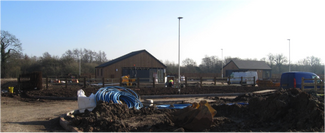Keeping Warm on Site

Pictured above: New site nearing completion at Old Damson Way, Solihull (Rooftop Housing) with large plots, individual service supplies and energy efficient amenity blocks which include a dayroom.
By LUCINDA LEECH
At present many people struggle to pay their bills for three main reasons: high energy costs, low incomes and homes which ‘leak heat’. Some people living on site are spending up to half their income on fuel during the winter, far in excess of the 10% above which households are recognised as being likely to be in ‘fuel poverty’.
Most sites rely on electricity and bottled gas which are the most expensive forms of fuel as can be seen in this graph:

So it is cheaper to heat with some fuels than others - how much does it cost for 2kW per hour for 5 hours, equivalent to a fan heater for the evening?

Similar differences can be seen elsewhere – 10minutes in a 9kW shower would cost around 25p with electricity but only 14 – 18p heated by bottled gas (not counting the cost of the water). Electricity may feel cheaper because you can top up with £5 or £10 rather than paying out for a new gas bottle but in reality each kWh costs much more.
Electricity is measured in kilowatts and you pay for kilowatt hours (kWh). Whether you pay your supplier directly, or through a prepayment key, or you buy cards from the Council you need to try and find out what you are paying per kWh (sometimes called a unit) so you can compare different possibilities. There is a wide range – in Feb ’15 one Council was selling on at a subsidised 10.2p per kWh on a pre-payment card compared with one of the ‘Big 6’ suppliers in the same area charging 18.26p on a pre-payment key. Direct Debit customers paid 15.5p.

The cost of gas varies too – in Feb 2015 a 47kg propane cylinder was reported as costing £52 on one site and £85 on another – official regulation is needed! Try shopping around if you have the opportunity or investigate bulk buying with others on your site.

Unfortunately the construction of caravans and trailers makes it difficult to fit in enough insulation so heat escapes fast. This happens even faster when you are trying to heat several small independent spaces and need to go in and out regularly to access the utility block. Also all the walls as well as the floor and roof are exposed to the cold outside air.

Lack of insulation and poor ventilation also causes condensation leading to damp and mould. In extreme cases this can lead to health problems such as respiratory problems, allergies and asthma.

Sharing information and demonstrating good ideas is a successful form of education for everyone.

Above: Houndsfield Lane site, Wythall for Rooftop Housing. ‘Pod’ built amenity units, manufactured off-site and brought in by crane to reduce disruption to residents. These are fully insulated and double-glazed – residents report being warm and dry in the coldest weather.
ASSISTANCE: There are various sorts of help available but often these need an individual electricity supply in your name.

If a pitch has its own named electricity supply the Energy Saving Trust has confirmed that:
If a Mobile (Park) Home is permanently sited then the resident can get an Energy Performance Certificate - they are not required to have one by law, but it is possible to get one (for which there is a charge). They could then potentially access the Green Deal Home Improvement Fund (GDHIF) which can provide up to £1000 towards the cost of installing any two of the following:
- a condensing gas boiler on mains gas
- double or triple glazing as a replacement for single glazing
- secondary glazing
- energy efficient replacement external doors
- cavity wall insulation
- floor insulation
- flat-roof insulation
- a replacement warm air unit
- fan-assisted storage heaters
- a waste water heat recovery system
From time to time it is also possible to claim GDHIF support for solid wall insulation, which is how the wall insulation for a park home would be described. Funds for solid wall insulation have currently run out but we expect a new release of funds for this in February or early March. (2015)
These possibilities are of course also available for members of the community living in houses.
Renewable Energy: The UK Government Feed-in Tariff scheme (where the owner gets paid for generating energy) for solar panels and thermal hot water systems apply to sites in some circumstances. It may be possible for the site owner to invest in the technology and the residents to get some free electricity.
For further help in all these areas try asking advice (though not all of it will be relevant to caravans and trailers):
